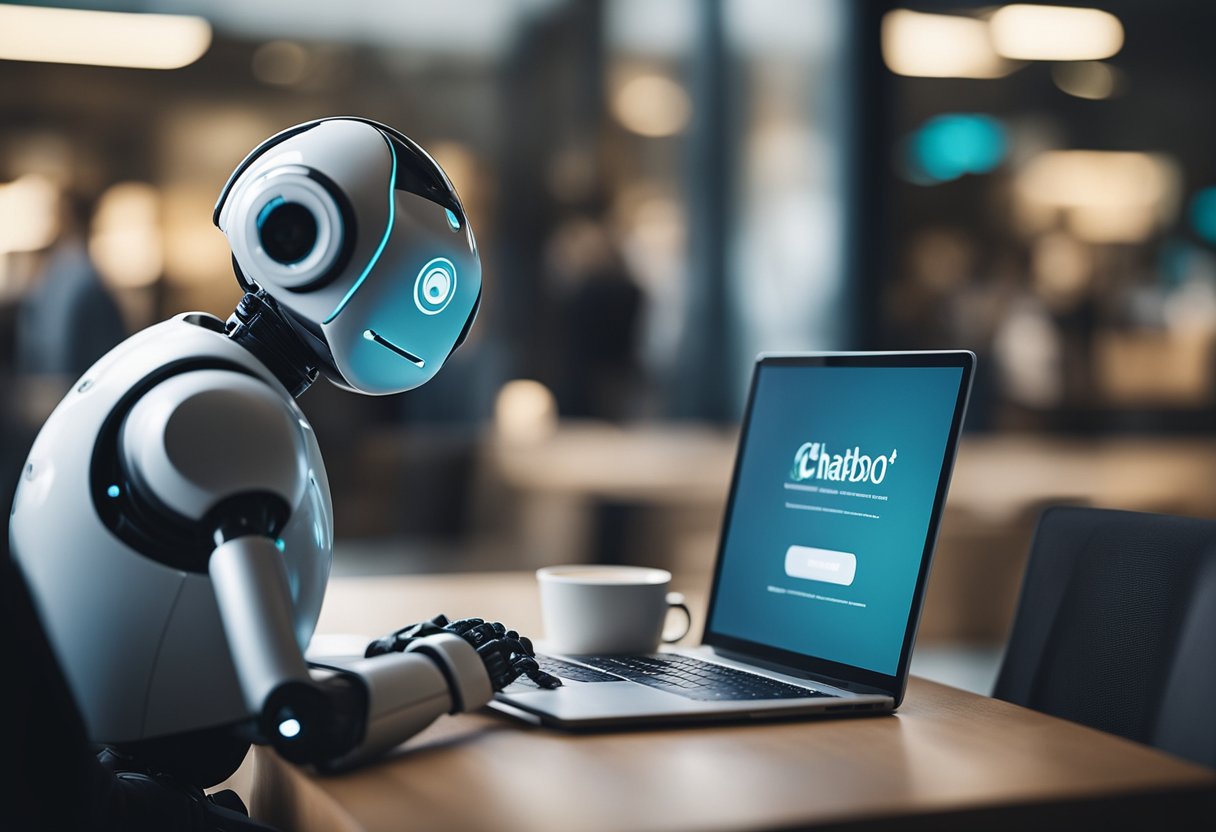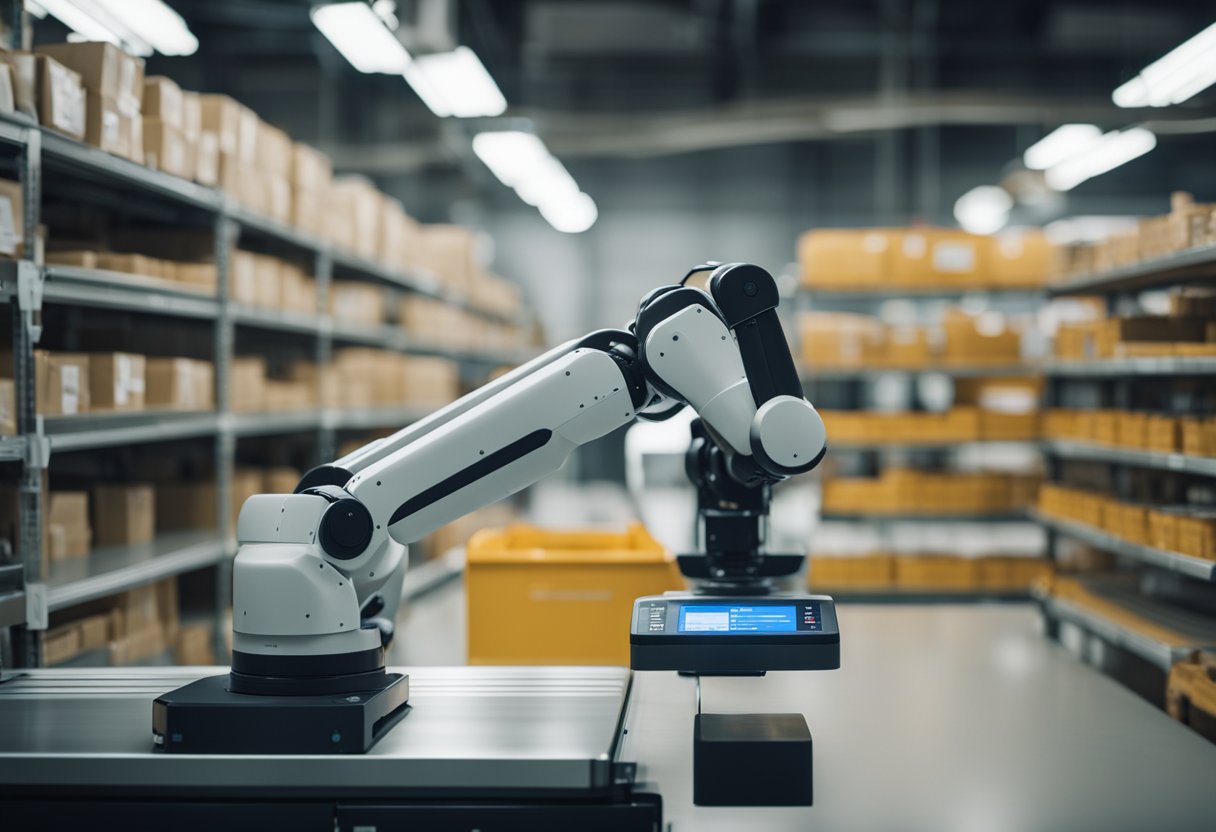Small businesses are constantly seeking ways to stay competitive in a rapidly evolving market. With the advancements in technology, one of the most promising options for small businesses is the implementation of artificial intelligence (AI) projects. AI has the potential to revolutionize the way small businesses operate, by automating tasks, providing personalized experiences to customers, and improving efficiency.
In this article, we will present 29 AI project ideas for small businesses in 2024. These ideas cover a wide range of industries, from retail to healthcare, and are designed to help small businesses take advantage of the latest AI technologies. Whether you're looking to improve customer engagement, streamline operations, or gain insights into your business, these ideas will provide a starting point for your AI journey.
Leveraging Chatbots for Customer Service
In today's fast-paced business world, customer service is more important than ever. Small businesses need to be able to provide quick and efficient customer service to keep up with their competitors. One way to do this is by leveraging chatbots.
Chatbots are computer programs designed to simulate conversation with human users. They can be programmed to answer common customer questions, provide product recommendations, and even process orders. By using chatbots for customer service, small businesses can save time and money while providing a better customer experience.
Here are a few ways small businesses can leverage chatbots for customer service:
-
24/7 Availability: Chatbots can be available 24/7, which means customers can get help whenever they need it. This is especially important for businesses that operate in different time zones or have customers in different parts of the world.
-
Quick Response Time: Chatbots can provide quick responses to customer inquiries, which can help improve customer satisfaction. Customers don't have to wait on hold or wait for an email response, which can be frustrating.
-
Personalization: Chatbots can be programmed to provide personalized recommendations based on a customer's previous purchases or browsing history. This can help increase sales and improve the customer experience.
-
Cost Savings: By using chatbots for customer service, small businesses can save money on staffing costs. They don't have to hire as many customer service representatives, which can be expensive.
Overall, chatbots can be a valuable tool for small businesses looking to improve their customer service. By providing quick and efficient service, businesses can improve customer satisfaction and increase sales.
Implementing AI for Inventory Management
Small businesses can benefit from implementing AI for inventory management. AI can help businesses optimize their inventory levels, reduce waste, and improve their bottom line. In this section, we will discuss two ways that small businesses can use AI for inventory management.
Demand Forecasting
Demand forecasting is the process of predicting how much inventory a business will need based on historical sales data. This can be a time-consuming process, but AI can help automate it. By analyzing historical sales data and other relevant factors, AI can provide accurate demand forecasts that can help businesses make better inventory decisions.
One way that businesses can implement AI for demand forecasting is by using machine learning algorithms. These algorithms can analyze large amounts of data and identify patterns that humans may not be able to see. By using machine learning algorithms, businesses can get more accurate demand forecasts and make better inventory decisions.
Automated Reordering
Automated reordering is another way that businesses can use AI for inventory management. Automated reordering is the process of automatically ordering inventory when it reaches a certain level. This can help businesses avoid stockouts and ensure that they always have enough inventory on hand.
AI can help automate the reordering process by analyzing inventory levels and sales data. By using AI, businesses can set up automatic reordering rules that will trigger when inventory levels reach a certain threshold. This can help businesses save time and reduce the risk of stockouts.
In conclusion, implementing AI for inventory management can help small businesses optimize their inventory levels, reduce waste, and improve their bottom line. By using AI for demand forecasting and automated reordering, businesses can make better inventory decisions and ensure that they always have enough inventory on hand.
AI-Driven Content Creation
Small businesses can benefit greatly from AI-powered content creation tools that help them generate high-quality content quickly and efficiently. With the help of AI, businesses can create content that resonates with their audience, drives engagement, and boosts their online presence.
Social Media Content
Social media is a powerful tool for small businesses to connect with their audience and promote their brand. AI-powered content creation tools can help businesses create engaging social media content that attracts followers and drives engagement.
For instance, businesses can use AI tools to generate social media posts, including captions, hashtags, and images. These tools use natural language processing and machine learning algorithms to analyze the business's brand voice, target audience, and trending topics to create compelling social media content.
Blog Post Generation
Blogging is a great way for small businesses to establish themselves as thought leaders in their industry and attract new customers. However, creating high-quality blog posts can be time-consuming and challenging, especially for businesses with limited resources.
AI-powered content creation tools can help businesses generate blog posts quickly and easily. These tools can analyze the business's industry, target audience, and existing content to generate blog post ideas and even write the posts themselves.
For instance, businesses can use AI tools to generate blog post outlines, headlines, and even full articles. These tools use natural language generation algorithms to create content that is informative, engaging, and optimized for search engines.
Overall, AI-driven content creation is a powerful tool for small businesses looking to streamline their content creation process and improve their online presence. With the help of AI, businesses can create high-quality content that attracts and engages their audience, without spending hours researching and writing.
Personalized Marketing with AI
Small businesses can leverage AI to personalize their marketing efforts and achieve higher conversion rates. By analyzing customer data, AI algorithms can identify patterns and make predictions about customer behavior, allowing businesses to tailor their marketing campaigns to individual customers. Here are two ways small businesses can use AI for personalized marketing:
Customer Segmentation
AI can help businesses segment their customers based on various criteria such as demographics, purchase history, and browsing behavior. By grouping customers with similar characteristics, businesses can create targeted marketing campaigns that are more likely to resonate with each group. For instance, a clothing store can use AI to segment customers based on their preferred style, and then send targeted promotions for items that match their preferences.
Targeted Email Campaigns
Email marketing is still one of the most effective ways to reach customers, but it can be time-consuming to create personalized emails for each individual. AI can help automate this process by analyzing customer data and creating personalized email campaigns that are tailored to each customer's interests and behavior. For example, an online retailer can use AI to send targeted emails to customers who have abandoned their shopping carts, offering them a discount on the items they left behind.
Overall, AI can help small businesses create more effective marketing campaigns by personalizing their messaging and targeting the right customers at the right time. By leveraging AI, small businesses can compete with larger companies and achieve higher conversion rates.
Sales Prediction Models
One of the most significant advantages of AI is its ability to predict future outcomes based on historical data. Sales prediction models are a perfect example of this. By analyzing past sales data, AI algorithms can predict future sales trends and help small businesses plan their operations accordingly.
There are several types of sales prediction models that small businesses can use. One of the most popular is the time series analysis model. This model uses historical sales data to identify patterns and trends in sales over time. The algorithm can then use this information to predict future sales trends.
Another type of sales prediction model is the regression analysis model. This model uses historical sales data and other variables, such as marketing spend, to predict future sales. The algorithm can identify which variables have the most significant impact on sales and use this information to make predictions.
Small businesses can also use machine learning algorithms to create custom sales prediction models. These models can be tailored to the specific needs of the business and can use a combination of historical data and other variables to make predictions.
Overall, sales prediction models are a powerful tool for small businesses looking to plan their operations and make informed decisions. By leveraging AI algorithms, small businesses can gain a competitive advantage and increase their chances of success in the marketplace.
AI-Powered Security Solutions
As technology advances, businesses need to ensure their security measures keep up with the changes. AI-powered security solutions have become increasingly popular, providing businesses with advanced protection against potential threats. Here are two areas where AI can help enhance security for small businesses:
Fraud Detection
Fraudulent activities can cause significant financial damage to businesses. AI-powered fraud detection systems can help identify suspicious transactions and prevent fraudulent activities. These systems can analyze large amounts of data in real-time and detect patterns that may indicate fraudulent behavior. By implementing AI-powered fraud detection, businesses can proactively identify and prevent fraud before it causes any significant damage.
Network Security
Network security is crucial for any business, regardless of its size. AI-powered network security systems can help identify potential threats and vulnerabilities in real-time. These systems can analyze network traffic and detect any unusual behavior or patterns that may indicate a potential threat. AI can also help businesses prioritize security alerts, reducing the risk of missing critical security issues.
In conclusion, AI-powered security solutions have become essential for small businesses to protect against potential threats. By leveraging AI, businesses can enhance their security measures and ensure they stay ahead of potential risks.
Optimizing Websites with AI
Artificial intelligence is revolutionizing the way small businesses approach website optimization. By leveraging AI, businesses can improve their website's performance and user experience, leading to increased engagement and conversions. Here are two ways small businesses can optimize their websites with AI:
SEO Analysis
Search engine optimization (SEO) is critical for small businesses to improve their online visibility and attract more visitors to their website. With AI-powered SEO analysis tools, businesses can identify areas of improvement and optimize their website for search engines.
AI algorithms can analyze website content, backlinks, and other factors to provide actionable insights for improving SEO. For example, AI tools can suggest relevant keywords and phrases to include in website content, identify broken links, and provide recommendations for improving website load times.
User Experience Personalization
Personalizing the user experience is another way small businesses can optimize their website with AI. By analyzing user behavior and preferences, AI algorithms can provide personalized recommendations and content to improve engagement and conversions.
AI-powered chatbots and virtual assistants can provide personalized support and assistance to website visitors, improving their experience and increasing the likelihood of conversion. Additionally, AI algorithms can analyze user behavior to suggest personalized product recommendations, promotions, and other offers.
Overall, AI-powered website optimization tools can help small businesses improve their online presence and attract more visitors to their website. By leveraging AI, businesses can provide a more personalized and engaging user experience, leading to increased conversions and revenue.
Smart Energy Management
Smart energy management is becoming increasingly important for small businesses as they seek to reduce their carbon footprint and save on energy costs. With the help of AI, businesses can optimize their energy usage and reduce waste.
One way small businesses can implement smart energy management is by installing smart thermostats. These devices use machine learning algorithms to learn the business's heating and cooling patterns and adjust the temperature accordingly. This can result in significant energy savings and lower utility bills.
Another option is to use AI-powered energy monitoring systems. These systems can track energy usage in real-time and provide insights into where energy is being wasted. With this information, businesses can make informed decisions about how to reduce their energy consumption and save money.
AI can also be used to optimize lighting systems. Smart lighting systems can automatically adjust the brightness and color temperature of lights based on occupancy and natural light levels. This can result in energy savings and a more comfortable work environment for employees.
Overall, smart energy management is an effective way for small businesses to reduce their carbon footprint and save on energy costs. By leveraging AI-powered solutions, businesses can optimize their energy usage and make informed decisions about how to reduce waste.
AI for Human Resources
Artificial Intelligence has revolutionized the way businesses approach human resources management. AI-powered solutions have enabled HR professionals to streamline their processes and make data-driven decisions. In this section, we will explore two areas where AI can play a vital role in HR management: Talent Acquisition and Employee Retention.
Talent Acquisition
AI can be used to automate the recruitment process, making it more efficient and cost-effective. Here are some ways AI can help in talent acquisition:
- Resume Screening: AI-powered resume screening tools can analyze resumes and shortlist candidates based on specific criteria such as skills, experience, and education.
- Candidate Matching: AI can match candidates with job openings based on their skills, experience, and personality traits. This can help recruiters find the best candidates for the job.
- Chatbots: AI-powered chatbots can interact with candidates, answer their questions, and schedule interviews. This can save recruiters a lot of time and effort.
Employee Retention
AI can also help in retaining employees by identifying potential issues and addressing them before they become problems. Here are some ways AI can help in employee retention:
- Predictive Analytics: AI can analyze employee data such as performance, engagement, and satisfaction to identify patterns and predict which employees are at risk of leaving. This can help HR professionals take proactive measures to retain those employees.
- Personalized Learning: AI can provide personalized learning and development opportunities to employees based on their skills, interests, and career goals. This can help employees feel valued and engaged, leading to higher retention rates.
In conclusion, AI can play a crucial role in human resources management by automating processes, providing insights, and improving employee engagement. Small businesses can leverage AI to gain a competitive advantage in the recruitment and retention of top talent.
Business Intelligence and Analytics
Small businesses can leverage AI to gain insights into their operations and make data-driven decisions. Here are a few AI project ideas for business intelligence and analytics:
- Predictive analytics: By analyzing historical data, AI algorithms can predict future trends and help small businesses make informed decisions. For example, a small retailer can use AI to predict which products are likely to sell well during a particular season or event.
- Customer segmentation: AI can help small businesses segment their customers based on their behavior, demographics, and other factors. This can help businesses tailor their marketing campaigns and product offerings to specific groups of customers.
- Sentiment analysis: AI can analyze social media and other online platforms to determine how customers feel about a particular brand or product. This can help small businesses understand their customers' needs and preferences and improve their products and services accordingly.
- Fraud detection: AI can analyze financial transactions and detect fraudulent activities in real-time. This can help small businesses prevent financial losses and protect their customers' data.
- Supply chain optimization: AI can optimize supply chain operations by analyzing data on inventory levels, demand, and shipping times. This can help small businesses reduce costs and improve efficiency.
By implementing these AI projects, small businesses can gain a competitive edge and improve their bottom line. However, it's important to remember that AI is not a magic bullet and requires careful planning and execution. Small businesses should work with experienced AI consultants or vendors to ensure that they are using AI effectively and ethically.
AI-Enhanced Customer Relationship Management
Small businesses can leverage AI to enhance their customer relationship management (CRM) processes. AI-powered CRM solutions can help small businesses automate and streamline their customer interactions, enabling them to provide personalized and timely services to their customers.
One way AI can enhance CRM is by analyzing customer data to identify patterns and trends. This can help businesses understand their customers' needs and preferences, enabling them to tailor their products and services accordingly. AI can also help businesses identify potential leads and target them with personalized marketing campaigns.
Another way AI can enhance CRM is by automating customer service processes. AI-powered chatbots can handle routine customer inquiries, freeing up human agents to focus on more complex issues. AI can also analyze customer feedback and sentiment to identify areas for improvement and provide actionable insights to businesses.
Small businesses can also use AI to improve their sales processes. AI-powered sales tools can help businesses identify the most promising leads and prioritize them for follow-up. AI can also help businesses personalize their sales pitches and recommend products and services based on customers' past purchases and preferences.
In summary, AI can help small businesses improve their customer relationship management processes by automating routine tasks, providing actionable insights, and enabling personalized interactions with customers. By leveraging AI, small businesses can enhance their competitiveness and deliver better services to their customers.


















